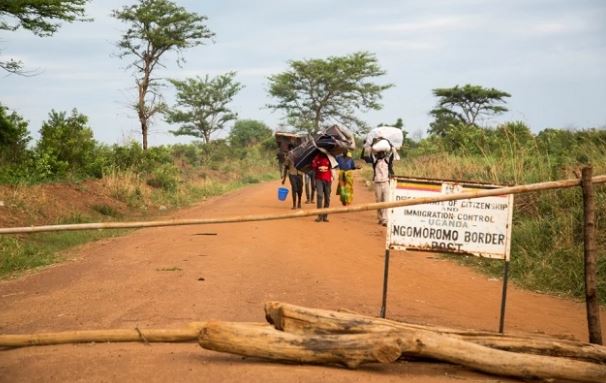A commander of one of the South Sudan People Defense Forces’ (SSPDF) units in Magwi County in Eastern Equatoria State has raised an alarm over the continuous detention of three of his soldiers by the Uganda People’s Defense Force (UPDF) in the neighboring country.
According to sources, on 26 June, three SSPDF soldiers were arrested by Ugandan troops in the Owinykibul area along the common border and incarcerated in Uganda’s Lamwo District.
Locals told this publication that the UPDF encroached into South Sudanese territory earlier last month, established a military base, and started harassing farmers along the border, creating fear and panic among citizens.
Major John Gatluak, the SSPDF’s Acting Commander at the Nyacigak Nyaculuk Military Training Center in Owinykibul, confirmed to Radio Tamazuj on Wednesday that three SSPDF soldiers were indeed arrested by Ugandan troops while patrolling the common border last month. He said it is not the first time that the Ugandan forces have arrested SSPDF soldiers along the border.
“We have some forces stationed between the border of South Sudan and Uganda under the command of Samuel Majak Makoi and on 27 June, he went on patrol with two of his soldiers. Upon reaching the border, Ugandan civilians farming in South Sudan territory after seeing our soldiers, ran to their soldiers in Uganda,” he explained. “After our soldiers returned to their barracks, the commander of Ugandan forces sent an order through their Military Intelligence ordering Majak to go to him. Majak went and they had a fight after which the Ugandan soldiers arrested and detained our soldiers up to today. They are currently in Padibe Prison in Uganda.”
According to Major Gatluak, they have severally alerted and informed the army’s leadership at the SSPDF General Headquarters in Bilpham in Juba about Ugandan forces encroaching into South Sudan.
He however revealed that the UPDF in Lamwo had earlier assured them that three detained SSPDF soldiers would be released on Monday which did not happen and that he is worried for his other troops along the border.
“We have notified our main barracks that we have soldiers arrested by Ugandan forces and they told us to stay calm and that if there is any problem between the two armies, it is their responsibility,” Maj. Gatluak revealed. “However, till now, there has been no reply at all. I even communicated with the Commissioner of Lamwo District in Uganda and they assured us that our soldiers will be brought but we are not sure if they will bring them or not.”
“What the UPDF is doing is extremely wrong because as soldiers, we cannot intervene in land disputes and this is a total violation of the law,” he added.
For his part, Magwi County Commissioner Benjamin Pole-Pole Olum confirmed the encroachment by UPDF soldiers on South Sudanese territory and said it was a threat to both the SSPDF and civilians.
“People have to remain calm as per the advice of our state authorities who said that the two countries will sit down and negotiate the matter,” he said. “In Owiny at a place called Chuki where the SSPDF put a small SSPDF barracks to monitor the security at the border between Uganda and South Sudan, the UPDF arrested and detained three of our soldiers since 26 June.”
Commissioner Olum added: “The governments of the two countries are now involved and it is now beyond the county administration but I am very concerned because we have enough data that shows encroachment by Ugandans into South Sudan.”
Meanwhile, Oyet Joseph Charles, the chief of Owinykibul Payam, said the Ugandan Army has entered 25 kilometers inside South Sudan from the original borderline and deployed troops inside South Sudan who threaten and grab farms from South Sudanese.
“Those detained are three SSPDF soldiers and they were taken up to Acholpii in Uganda and yet they were arrested inside South Sudan territory. The UPDF also deployed their forces inside South Sudan and encroached 25 kilometers from the border up to a place called Gol-Lela,” he clarified. “Many people, including returnees from the refugee camp in Uganda, are cultivating there but now the presence of UPDF has disrupted farming activities. Some farms and land have been grabbed by the Ugandans.”
Efforts to reach the UPDF commander in Lamwo District for comment were futile.
In May 2022, UPDF killed three SSPDF soldiers and a South Sudanese policeman along the common border of Yumbe District in Uganda and Kakjo Keji y in South Sudan’s Central Equatoria State.
At the time, Ugandan authorities accused the deceased of raiding Ugandan villages, robbing people of money, and looting livestock and properties. South Sudanese local authorities on the ground however countered that the Ugandan citizens had encroached and settled in South Sudan.
In October 2022, another confrontation happened between the two armies over a disputed border area between South Sudan and Uganda that claimed the lives of two SSPDF soldiers.
SSPDF Spokesperson Gen. Lul Ruai at the time said the UPDF launched an attack on an army base in South Sudan, leading to the killing of its soldiers at the Pogee border post in Eastern Equatoria State’s Magwi County.
The Ugandan army countered by saying they opened fire on SSPDF elements who tried to encroach into its territory by placing a border post at an area located two kilometers from the Ngomoromo border in Lokung Sub-County in Uganda’s Lamwo District.
Several border communities around South Sudan often complain about armed civilians, cattle raiders, and even armed forces from neighboring countries, especially, Kenya, Uganda, and Sudan, encroaching on the country’s territory. This has always led to skirmishes and conflict along the disputed borders but the Government of South Sudan has always called for calm, discouraged local governments from getting involved, and often promised that border disputes would be resolved by the national government and its neighboring counterparts.




